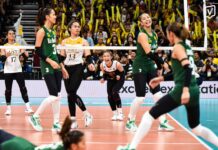JOURNALISM is power. Work hard to deserve it.
ABS-CBN News and Current Affairs Department head Maria Ressa threw this to aspiring journalists attending Inkblots 2006, in its eight fellowship of key media personalities and campus writers from around the country.
Veteran journalists like Ressa and Charie Villa of ABS-CBN, Philippine Daily Inquirer (PDI) reporter Christian Esguerra and editorialist Joselito Zulueta, Sunday Inquirer Magazine associate editor Ruel de Vera, Tempo Entertainment editor Nestor Cuartero, Newsbreak managing editor Glenda Gloria, and Victor Emmanuel Carmelo Nadera, Jr. of the University of the Philippines Institute of Creative Writing were the plenary lecturers in the event held Oct. 17-19 at the Thomas Aquinas Research Complex and the Beato Angelico Bldg.
About 250 budding writers from universities and colleges from as far as Isabela, Baguio, and Tuguegarao in the North, and Davao and Tacloban in the South, traveled to Manila to hear from the journalism authorities.
Keynote speaker Ressa recounted her experiences as former bureau chief of CNN International in Jakarta, as she trailed the activities of the Al-Qaeda terror group and the 1997 Asian financial crisis, before working with ABS-CBN.
“Journalism is a calling where you have to give your physical, emotional, and psychological being to stick to your ideals,” she said. “You cannot be objective but you can be comprehensive. Read international news from the net and muster the skills to compete globally.”
Ressa said a good campus journalist is someone who can weave together different perspectives of a news scoop, to give out as complete a picture as possible. “A good journalist adds context and analysis,” she added.
Former Varsitarian editor in chief Esguerra taught the fellows how to write news articles beyond the traditional format.
“Come up with anecdotes in your lead to featurize your news. You can source them from your interviews to give human interest to your story,” he said. Esguerra earned the Reporters of the Year Award by the Volunteers Against Crime and Corruption last year.
Don Carlos Palanca Awards recipient De Vera discussed Culture and Lifestyle Writing, advising students to write the way they talk and experience a variety of fashion, art, food, travel, and movies.
Quartero, a former Varsitarian Circle and Features editor, gave a short writing activity on constructing a good feature lead.
“Through carefully chosen words, you should be able to describe people’s features—what they wear, how they move, laugh, cry, and behave,” he said. “Use dialogue to keep a story moving. Adapt your writing style to the theme of the story.”
Gloria, co-winner of the 2002 National Book Award in her journalism book on Mindanao, delivered pointers on investigative journalism which she calls “journalism of outrage.” She stressed accountability, team-work, long-term research, the use of crime-solving tools, and probing of civil conscience in an investigative report.
“Surveillance tools can lead you to some information but you don’t base on them, you confront the people you are investigating,” she said. “Investigative reporters must have low tolerance for fraud and inaccuracy. If you yourself find your write-up wrong, don’t pursue it.”
After discussing the issues behind Filipino being the country’s official language, former Varsitarian editor in chief Vim Nadera taught the fellows how to write Filipino poetry through rules of rhymes and meter.
University’s intelligentia
In giving a lecture on newspaper layout using samples from existing and defunct dailies, Varsitarian publications adviser and PDI editor Joselito Zulueta reiterated the role of the campus press.
“The campus press is a social register,” he said. “It sets the agenda and the ideals of the schools, so the writers themselves must be informed and should be part of an intelligentia toward excellence.”
Preceded by a short forum with the UST Tigers, UAAP Season 69 Men’s Basketball Champion and Philippine Star sports columnist Quinito Henson described sports writing as a “dramatization of life.”
“No other campus activity can unify a school as good as sports,” Henson said. “Everybody can identify with sports because there is a struggle, conflict, preparation, risks, excellence, failures, and rewards in a game.”
Henson formed a mock press conference with his guest, Berthune “Siot” Tanquincen, The speaker for Press Ethics, ABS-CBN’s Newsgathering Department head Charie Villa, discussed how to handle “gifts” and “donations” to journalists and the responsibility of the writer to protect his sources even when faced by court subpoenas.
Specialized journ
Parallel sessions on Photojournalism, Cartooning, and Column and Broadcast Writing were held on the second day of the event.
GMA-7 reporter Sandra Aguinaldo showed clips of television reports and how they were produced from script-writing to television-airing.
Jess Abrera, PDI cartoonist for 21 years, presented how cartoons could be used in election posters, advocacy campaigns, political cartoons, and even book illustrations.
“Drawing cartoons is pleasurable especially when you know the issue and you know how to ‘say’ it. One does not really need to be good in drawing. What is important is that the cartoonist knows the essence of the issue,” he said.
Manuel Quezon III, PDI columnist and 1994 Opinion Writer of the Year, advised campus columnists to write in a conversational manner, and to be informed of current affairs in taking sides on issues.
“The task of the columnist is to follow and analyze issues the way others can’t,” he said. “You have a role to challenge but if the issue is not worth it, there are always other things to write about.”
Those who attended the session on photojournalism were given hands-on lecture on proper shutter speeds and apertures by PDI photographer Ernie Sarmiento, who was also a former Varsitarian photographer.
In a panel discussion with the topic, “Is there a need to professionalize Journalism, Advertising, and Communication professions through a national board exam?” the fellows interacted with GMA-7 Reporter’s Notebook documentarist Rodrigo “Jiggy” Manicad and former New York Times correspondent Alice Colet-Villadolid. Manicad said that board exams for media practitioners could be abused to limit creative expressions and opinions. Villadolid, a proponent of the board exams, said the exams would check fly-by-night journalism.
The gathering of campus journalists closed with a fellowship night
Daredevils but no devils, the speakers throughout the fellowship emphasized the need to uphold media ethics.
“My advice to you is to be always resourceful. If you want to leave a mark as a journalist, you should put your ethics in priority,” Henson said. “You won’t survive journalism if you only think of instant money and prestige. Always work for your ideals first,” Manicad added. With reports from Ivan Angelo L. de Lara and R. S. Mejia

















